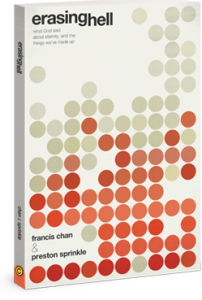 In Erasing Hell, Chan and Sprinkle have written an engaging primer on the doctrine of hell. The book first appeared in 2011 as an evangelical response to Rob Bell’s controversial Love Wins, the conclusions of which Chan and Sprinkle ultimately reject. Even so, it is respectful in tone and measured in its criticisms of Bell’s arguments.
In Erasing Hell, Chan and Sprinkle have written an engaging primer on the doctrine of hell. The book first appeared in 2011 as an evangelical response to Rob Bell’s controversial Love Wins, the conclusions of which Chan and Sprinkle ultimately reject. Even so, it is respectful in tone and measured in its criticisms of Bell’s arguments.
In Erasing Hell, the authors consider the various biblical teachings on the subject from both the Old and New Testaments, as well the theological implications of this doctrine and the emotional and psychological difficulties that it presents. Certain key historical figures, like Origen, are considered as well.
Chan writes openly of his own struggles with the doctrine of hell but then concludes that the witness of scripture and of Christ is simply too clear for him to accept universalism. Chan does an admirable job of not allowing the conversation to become theoretical, reminding us time and again that these are very real people we are speaking of when we speak of the potential inhabitants of hell. Thus, the Church most be diligent and passionate in its proclamation of the gospel, the good news that Christ has come to free us from sin, death, and hell.
I was somewhat surprised to see an honest struggle in this book over the question of the duration of hell. The authors argue that hell clearly exists and is taught in scripture but that some passages speak of it as destruction (possibly implying something like annihilationism) whereas other passages speak of it as ongoing and eternal. Again, I was a bit surprised by this, but then I read that Preston Sprinkle, Chan’s coauthor, appears to be leaning now toward annihilationism, so it is likely that the hesitation on this topic found in the book can be attributed to Sprinkle’s own struggles over this question. Who knows?
Even so, this is a thoughtful and helpful book on a difficult but important topic.
